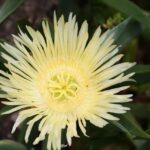Kanna Vs. ashwagandha: learn all the differences and similarities. Both kanna and ashwagandha are natural remedies to cope with anxiety, depression, or other mental issues. But what are their differences? Which one is better? Whilst these herbal products may bring about similar effects, they also have many differences. In this article, we will explore each of these herbs, their effects, and how they work. But we will also discuss their side effects and how they might interact with medications or other herbs. Keep reading this article to discover the benefits of ashwagandha and kanna. And also to find out which of these herbs is best for you!
What Is Kanna?
Kanna (Sceletium tortuosum) is a succulent plant in the Aizoaceae family native to South Africa. This plant has small white and yellow flowers, but it is in its leaves and roots that we find its therapeutic benefits.
For many generations, the San and the Khoikhoi people in South Africa used to chew the leaves of kanna to cope with pain, treat colic or as a general tonic. Kanna was also used in rituals and ceremonies. In the 17th century, Dutch navigator Jan van Riebeeck was the first person to describe kanna and its uses. Dutch settlers called kanna “kougoed”, which means “chewable”, because the local population usually chewed its leaves to enjoy its benefits. However, they also used kanna leaves to smoke, make tea or even to prepare tinctures.
What Is Ashwagandha?
When talking about kanna vs. ashwagandha, not all differences come from their effects and properties. We can also talk about where these plants come from. Whilst kanna is an African plant, ashwagandha comes originally from Asia. More precisely, ashwagandha is native to the Indian subcontinent and grows naturally in India, Pakistan or Sri Lanka. However, today you can also find ashwagandha growing in Africa or even in mild regions in North America.
Ashwagandha is now a very popular healing herb. Arguably, this popularity is due to the use of ashwagandha in Ayurveda, the traditional medicine from India. The root of ashwagandha has traditionally been used in Ayurvedic medicine and folk medicine to promote relaxation, vitality, and good memory, among many other things. As we will see below, ashwagandha is one of the most versatile herbal remedies and has plenty of uses and effects.
Kanna Vs. Ashwagandha: Effects and How They Work
How do kanna and ashwagandha work? What are their effects? No doubt, these are the main questions when discussing kanna vs. ashwagandha. Both plants seem to be helpful when coping with anxiety or disorder. But they also work differently, and their effects vary. In this section, we will discuss the effects and properties of these herbs.
Kanna Effects
Let’s begin by kanna! Kanna is not as popular as ashwagandha or as many other healing plants. Nevertheless, kanna is one of the best natural remedies for depression and anxiety. And how does kanna work? What are its effects and uses? The main uses of kanna include:
- Relieving the symptoms of depression
- Coping with anxiety disorders
- Getting a boost of energy
- Improving mood
- Promoting calm and relaxation
- Fighting insomnia and sleep disorders
Moreover, kanna also has mild anti-inflammatory effects. The effects of kanna come from its alkaloids, especially mesembrine and mesembrenone. Kanna alkaloids act by inhibiting the reuptake of serotonin in your brain. That is, kanna is a natural selective serotonin reuptake inhibitor (SSRI), which is exactly how conventional antidepressants work. Hence, we can say that kanna is a natural antidepressant. Serotonin is a neurotransmitter that regulates mood, anxiety, happiness or social behavior. Furthermore, serotonin also plays a key role in the production of melatonin, which is arguably the most important hormone for a healthy sleep routine. SSRIs do not produce new serotonin. Instead, kanna and other SSRIs increase the level of serotonin available.
Ashwagandha Effects
Let us move now to ashwagandha. The effects of ashwagandha include:
- Anxiety relief
- Stress relief
- Improvement of the symptoms of depression
- Mood-boosting
- Improvement of fertility in men
- A gain of muscle mass
- Lower cholesterol levels
- Cognitive functions improvement
As you can see, ashwagandha has more uses than kanna. However, the anxiolytic and antidepressant effects of ashwagandha may be milder, but still effective. The effectiveness of ashwagandha may be due to its anti-inflammatory properties and its action on the GABA receptors. GAB (gamma-aminobutyric acid) is a neurotransmitter that regulates stress response, behavior, and cognitive functions. Moreover, ashwagandha also has antioxidant effects that prevent cell and neuronal damage. And ashwagandha also inhibits the action of acetylcholinesterase, an enzyme related to memory loss and learning impairment. It is thanks to this action that ashwagandha could also improve memory and other cognitive functions.
Kanna Vs. Ashwagandha: Side Effects and Interactions
What are the side effects of ashwagandha and kanna? When talking about kanna vs. ashwagandha, there are also differences regarding their side effects and interactions.
The side effects of ashwagandha include:
- High blood pressure
- Higher levels of thyroid hormone levels
- Worsening symptoms of auto-immune diseases
- Irritation of the gastrointestinal (GI) tract
Moreover, ashwagandha could interact with diabetes and pregnant women should avoid consuming it, as it might induce miscarriages. Finally, you should not take ashwagandha at least 2 weeks prior to surgery. Ashwagandha could increase the effects of anesthesia.
The side effects of kanna are:
- Headaches
- Appetite loss
- Drowsiness
- Diarrhea
- High blood pressure
Regarding the interactions, you should not combine kanna with other SSRIs or substances that interact with them. That includes prescription antidepressants and even other herbs, such as St. John’s wort. The interaction of kanna and these products may result in serotonin syndrome, which occurs when the levels of serotonin in your body are too high. The symptoms and consequences of serotonin syndrome include agitation, diarrhea, muscle rigidity, confusion, and heavy sweating. In some cases, serotonin syndrome can even be life-threatening.
As you can see, kanna and ashwagandha have many things in common, but also many differences. So, kanna vs. ashwagandha: which one is better? In the end, that will depend on what you are looking for.


